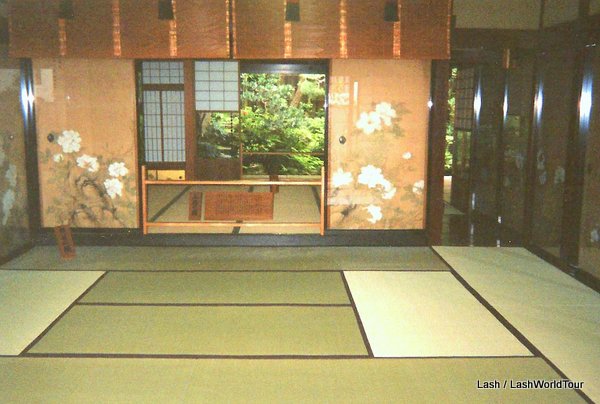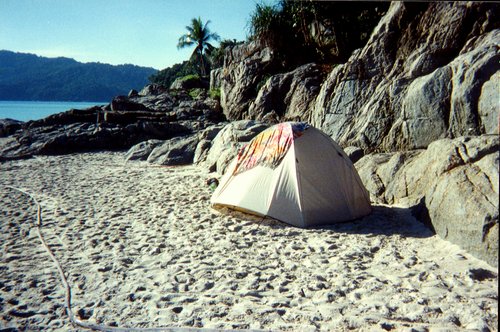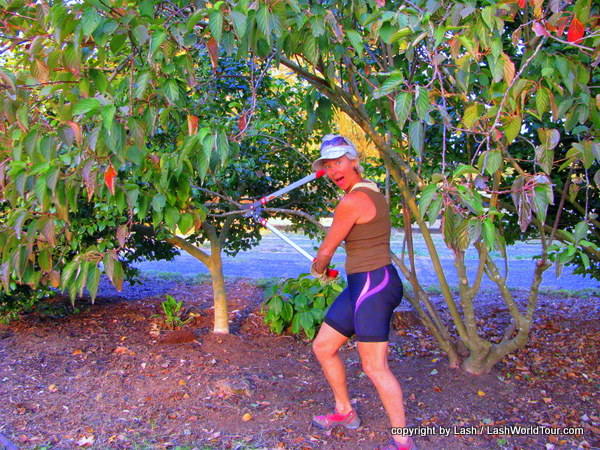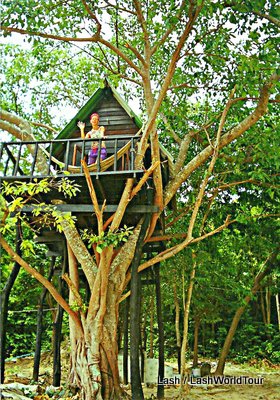TRAVEL TIPS: FREE ACCOMMODATION AROUND THE WORLD
Did you know that there are many types of free accommodation around the world? As a matter of fact, there are so many different options, that I’ve divided them into 3 categories: free accommodation you can obtain on your own, free accommodation at people’s homes, and accommodation where you work to earn your keep (aka volunteering).
A. Free accommodation you can obtain on your own
Camping
Free camping locations are available in many countries around the world: on beaches and islands; in jungles, forests, and mountains; at national, state, local and city parks; in people’s yards; beside rivers and lakes… the list goes on.
If you enjoy being out in nature and camping, it could be well worth your time carrying a tent, sleeping bag or sheet, and sleeping pad when you’re traveling the world. I often travel with my tent. That has allowed me to climb mountains and volcanoes, visit fairly primitive islands, camp in cities, and has rescued me several times where all local accommodation was fully booked out or was too expensive for my budget. I’ve camped for free or nearly free (< $1 US) in Thailand, Malaysia, Singapore, Indonesia, Japan, USA, Canada, and Australia.
In the USA, Australia, Canada and Japan, most free camping is reserved for remote, back-country camping, meaning you have to hike in to your campsite and facilities are very basic or non-existent. Sometimes you only have to walk in a short distance, though, which is quite handy.
Temples and Monasteries
Some Asian temples will give shelter to travelers in need, especially in remote areas where there’s no other accommodation, such as mountains and rural areas with no towns. Most temples don’t actually advertise this service and you can’t really ‘book ahead’. You just have to show up and ask to sleep somewhere. It’s a great, safe option if you’re low on funds, stuck in a remote area, or just want to experience temple life.
Some of my traveling friends tell me that monasteries in Europe often do the same. I haven’t traveled extensively around Europe yet, so I can’t give any specifics, but it’s worth checking into. Do you know anything more about this? Fill me in!
Sleeping at airports and train stations
Although I don’t personally consider airports and train stations the ideal places to sleep, they sometimes work great in a pinch. Many flight situations arise when sleeping in the airport is a great options for a night: Perhaps you’ve got a long lay-over between flights, or you’re in an expensive city, or you arrive late at night, or you’re about to enter a somewhat dangerous city late. Some airports, like Singapore’s fantastic Changi Airport, have areas set up specifically for travelers to sleep. In others, you just have to scout around for a low traffic area and lay down. It helps to have a sleeping pad, sleeping bag, or blanket of some sort. Floors can be hard and cold.
As for train stations, to be honest, the only place I’ve seen this done on a regular basis is in Japan. During long school holidays, thousands of Japanese youth travel around Japan on super-long train rides. It’s common to find a whole crowd of people sleeping in one end/corner/ side of a train station, waiting for a morning train or for daylight to head out on their adventures.
I’ve slept in Japanese train stations many times during long journeys around the country. Although I felt like a bum at first, once I saw so many other middle class people doing the same, it suddenly felt fun and adventurous. Of course Japan is super safe, which made it stress free. Not sure about trying this in other parts of the world! Have you ever tried it? Tell your story below!
————————————————————————————————————————————————
B. free accommodation at people’s homes
Couch Surfing and Tripping
These are online organizations that bring together travelers and locals in destinations all over the world who are happy to host travelers overnight in their homes. It’s fun and enjoyable for all involved. Travelers get a roof over their heads and get to make friends with locals and/or expats in the countries they visit. Hosts get to meet travelers from all over the world, hear great travel adventures, and show their guests around their home town. Everyone gets to swap travel tales.
Couch Surfing and Tripping do take some advanced inquiries, back n forth emails, and planning. I’ve personally found that I can’t find all my accommodation from these groups, but once in a while, I can co-ordinate with a host and meet someone new.
To get started, all you need to do is visit the couch surfing and/or tripping websites, sign up, preferably get yourself verified, introduce yourself by adding some personal data and a photo. Then you can start searching for hosts and contact them about a potential visit.
House Sitting
House sitting entails staying at someones’ home while they’re away. Stays last anywhere from a few days to several months, occasionally even 1-2 years. Many house owners have pets that need to be taken care of. Sometimes other duties are required, such as gardening, taking in the mail, keeping the house clean and paying utility bills. It generally amounts to free accommodation in exhange for looking after the house and/or pets.
Not surprisingly, house sitting takes some advanced planning, making inquiries, email exchanges. Often house owners require reference letters and/or police back-up checks. Sometimes they also require a cash deposit as guaruntee against damages, which house sitters will get back when the job is done.
Mind My House is the group I originally joined. You can find others with a Google Search.
If you’re interested in house sitting, I highly recommend reading my fellow travel bloggers’ great guidebook: How To Become A House Sitter. That book really helped me out when setting up my profile account on the house sitting sites, interacting with home owners, and staying well organized.
House swapping
If you own your own home, apartment or condo, you can join various house exchange organizations and find people all over the world to exchange houses with for a few days to a few weeks. Obviously, this will also take some planning ahead, research and negotiations with other home owners to find mutually agreeable travel times, places you’d like to stay, and someone who wants to visit your town. But it’s a fantastic way to travel to new destinations in the world without any accommodation expenses!
————————————————————————————————————————————————–
C. Working for your keep
HelpX & WWOOF
 WWOOF and HelpX are international organizations consisting of host farms and volunteer workers. Most hosts have organic farms, but there are also B&Bs, small resorts, backpackers, individual homes, and other kinds of farms that host volunteers.
WWOOF and HelpX are international organizations consisting of host farms and volunteer workers. Most hosts have organic farms, but there are also B&Bs, small resorts, backpackers, individual homes, and other kinds of farms that host volunteers.
The main guideline is to work half day in exchange for room and board. But each host is left to set up its own working hours and offerings. Hosts and volunteers then hash out the details into a mutually agreeable arrangement. Work Exchange positions could be as short as 1 week and as long as several months, though often a 1 month minimum works well.
In the WWOOF organization, most countries have their own national branch. In order to become a WWOOF volunteer, you must sign up for whichever country you’re interested in and pay their annual fee, usually amounting to $25-30 US. Quite unfortunately, you’re required to pay for each country you want to WWOOF in. However, once you start volunteering on one farm, you can usually get recommendations from other WWOOFers and perhaps exchange good farms. (but don’t tell WWOOF I told you so!)
HelpX membership, on the other hand, gives members access to all hosts in all countries around the world. In 2014, membership for volunteers costs €25 / $27 US for 2 years for worldwide hosts access.
Personally, I’ve been extremely impressed with HelpX. Having access to hosts all over the world is very inspiring for my ongoing travels. The membership cost is reasonable. And, best of all, I’ve found HelpX hosts to be very responsive to my requests.
I’d say 70-90% of hosts I’ve contacted have replied to me, even if just to say they’re sorry they can’t take me at that time. It’s so great to get a reply, one way or other, in order to plan my travels. I’ve also found most HelpX hosts to expect a fair amount of work, usually 4 hours per day with 1-2 hours off per week.
Be really careful about checking the host farms working, living and eating conditions. I’ve noticed that some farms expect volunteers to work 10-12 hours/day 6 day/week – just for room and board. In my opinion, that’s outrageous and those farms are taking advantage of a great organization to find free full-time labor. Don’t fall for it, unless you really want to work your butt off. A few years back I had an awful WWOOF experience in the USA over that very issue.
Other volunteer organizations
Many other ‘volunteer’ organizations are operating around the world, however most that I’ve checked out actually require ‘volunteers’ to pay quite a lot of money for room, board, and other expenses. In my opinion, that’s not volunteering, that’s paying to work.
My friend and fellow travel blogger, Shannon O’Donnell has written an excellent guidebook to Volunteering Around The World. If you’re interested in this kind of thing, Shannon’s book will help you tremendously in finding the best organizations for you and steering you through the quite complicated process of searching for, applying to, and joining up with volunteer work.
If you know of any other real volunteer organizations that actually don’t require you to pay to ‘volunteer’, please let me know! Comment below, comment on FB, or drop me an email. I’ll check them out and add them to my list.
QUESTIONS:
Have you used any of these types of free accommodatin during your travels? If so, which and how was it?
Do you know any other forms of free international accommodation? If so, please fill us in!
——————————————————————————————————————————————-
You might also find these posts useful:
Work Exchange: 50 Benefits of my HelpX Gigs in New Zealand
Budget Accommodation Around the World
—————————————————————————————————————————————————-



















 Hi! I'm Lash, an American nomadic world traveler who's been traveling solo since 1998. I’m passionate about traveling the world nomadically and then sharing it all with you. I hope to inspire you to travel the world, to entertain you with tales from the road, and to help you reach your travel dreams. Welcome!
Hi! I'm Lash, an American nomadic world traveler who's been traveling solo since 1998. I’m passionate about traveling the world nomadically and then sharing it all with you. I hope to inspire you to travel the world, to entertain you with tales from the road, and to help you reach your travel dreams. Welcome! 




8 pings
Skip to comment form ↓
TRAVEL TIPS: BUDGET ACCOMMODATION AROUND THE WORLD - LashWorldTour » LashWorldTour
2012/07/26 at 9:32 am (UTC 8) Link to this comment
[…] For information on other categories of accommodation, see more articles in this travel tips series:free accommodation / unique hotels of the world, pt 1 / unique luxury accommodation, pt 2bungalow at seaside resort in […]
How to Afford Long-Term World Travel pt 1 - The Three Components » LashWorldTour
2013/03/19 at 3:34 pm (UTC 8) Link to this comment
[…] less than a mortgage, car payments and monthly utilites. In fact, you can even find all sorts of free accommodation if you want. Besides that, everything else is less expensive too: food, drinks, toiletries, […]
How To Afford Long-Term World Travel pt 6 - Minimizing Costs on Accommodation » LashWorldTour
2013/04/25 at 2:45 pm (UTC 8) Link to this comment
[…] written a detailed post about these free accommodation options around the world. Check it out for more info. View from my balcony in Sapa, Vietnam. Room $4 […]